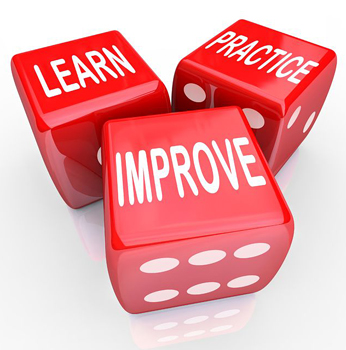Prepare for Powerful Conversations & Presentations
Latest Posts
- 2024 Reading List for Leaders
(posted: 07/01/2024)The right book can be a leadership game-changer.
- Coach's Notebook: Exec Presence for Leaders
(posted: 05/08/2024)As a leader your charisma is critical. Learn how to develop it!
- New Year's Resolutions vs New Chapters
(posted: 02/01/2024)Forget New Year's...Your new chapter can begin when you are ready!
Blog Archives
Kristi posts to her site about once a month, but frequently more often. She also appears as a featured contributer on select other sites. If you would like to be notified when new blogs are posted, please subscribe to our newsletter.
If you are interested in Kristi guest posting to your site feel free to contact us.
Prepare for Powerful Conversations & Presentations
(posted: October 3rd, 2014)

How do you feel when you have to speak in public, or have a difficult conversation?
If you said, "Nervous, terrified, or unhappy," you are not alone.
Preparation and practice will help. Whether you are...
Giving a TED talk
Attending a job interview
Presenting your great idea to investors
Or facing a difficult conversation with your board of directors, your boss or a direct report...
....It's all public speaking. Going deeper, it's all communication.
And, like any other skill, communication can be learned, developed, enhanced and improved.
You CAN go from good to great.
Start By Understanding Your Audience
You can't communicate effectively if you know nothing about your audience.
Who is your audience? What matters to them?
If you are speaking to a large audience, identify their problems as a group. Are they from a single industry? Are they all executives? What is the common thread connecting them? If it's a smaller audience - an interview panel, a group of investors - go deeper. Identify what their problem, pain, or need is, as specifically as you can.
Walk in your audience's shoes, sit in their seat. What do I need to know, what would I want to hear?
I make a point of interviewing a handful of audience or group members before I start customizing a presentation. This gets me much closer to them and their needs.
When you understand your audience, you can craft your talk to effectively share what they want to hear (not what you want to say). Then you will be communicating with your audience, not just talking.
Identify Your Intent, Hone Your Message
You need to know exactly what you want to convey to your audience before you start crafting your presentation, otherwise you will get off track and dilute your impact with unimportant elements. Identify what you want your audience to know when you are finished, or what you want them to feel, or do, or say, or all of the above.
I suggest to clients a simple but effective exercise:
- Determine your intention for your speech or conversation. Write it down.
- Make a list of all the points you want to make.
- Now apply your written intention to your written list of points.
Do your points support your intention? If not, get rid of them, or modify them so that they do. And keep in mind that, generally speaking, fewer (and simpler) are better.
This is especially effective when your "presentation" is actually a difficult conversation. It's easy to let unrelated points (and distracting emotion) creep into your conversation, but if you use the above exercise, you can keep your message tightly honed, keep the conversation on track, and it's more likely to end up going where you want it to.
Create a Strong Open & Close
- You have three seconds to make an impression on your audience.
"Hi, I'm Joe Speaker," is not going to make them sit up and take notice. Besides, they know who you are already.
Plan a surprising or dramatic or unexpected opening.
"I awoke in a pool of my own blood." (Arianna Huffington.)
Now you're connecting, and that guy checking Twitter is putting his phone down and paying attention!
Don't say, "I'm glad to be here," but show them, in your smile, your movements, the tone of your voice.
- The last few sentences of your talk will create a lasting impression, so use the opportunity well.
Your finish is going to leave the audience feeling...something. What do you want it to be? Don't end with the Q&A session. Wrap up with a summary, a call to action, a strong point.
And, no matter how uncomfortable it feels, stand silently for a few beats after your last words. Let the audience absorb that it's over and start to get up and leave. Don't let them focus on you gathering up your tools and moving off stage.
Practice. A lot.
You don't always have to deliver your talk word-for-word, but it will increase your confidence if you know it cold. Plus, when you know your material by heart it's easier to deviate, elaborate, or change it, depending on cues from your audience.
Chris Anderson (TED) worked with 12-year-old Richard Turere for many months before he gave his wildly popular TED Talk. TED typically spends six to nine months working with their less experienced presenters before they take the stage at TED, writing and revising a script, rehearsing again and again and again, fine-tuning the presentation and then practicing some more.
Even more seasoned presenters start preparing their presentations months in advance.
Rehearse. Out Loud.
After you've memorized your talk, continue to practice by rehearsing it.
You can certainly do this sitting in your car in traffic on the way to work, but also run through the whole thing for a "real" audience - One or several people who you trust and are comfortable with, but who also will give you honest feedback.
If you have the opportunity, work with a coach. He or she may record your practice sessions so that you can both review intangibles like body language and vocal tone.
Take your feedback and make changes, then continue to rehearse.
Ideally you will go from simple memorization of your content to knowing it so well you no longer sound like you committed a scrip to memory.
Q&A - Don't Let it Trip You Up

I've seen it again and again: Great talks that come apart when the presenter is thrown by the question and answer session. Some speakers actually don't know the answers, while others do, but because they didn't prepare they can't remember the answers in the heat of the moment.
This bears repeating: Being on stage is a uniquely stressful situation. It's in your, and your audience's, best interest for you to be as prepared as possible.
Spend some of your preparation time brainstorming questions you think might come up, and prepare answers to those questions.
Make the Q&A part of your practice and rehearsal time. You probably won't think of all possible questions, but you'll know how to answer many of them. Then, when some questions come up during your actual presentation that you can't answer, you can say, "That's a great question! I don't know the answer off hand, but I'll find out and let you know."
Note: Make sure to get contact info so that you really can get back to the questioner with an answer!
Learn, Grow, Practice...Repeat
Like any other skill, communicating, conversing and presenting well takes practice.
You'll have experiences where you don't do well, and ones where everything comes together like magic. Use both situations to learn - What went wrong? How can you improve it for next time? What did you do right, and how can you capture that and use it in the future?
Do your "post-game" recap as soon as possible after your presentation, while it's still fresh in your mind. I usually do mine on the drive home. If you do, too, think about recording verbal notes. Make sure you review them later.
If you had a trusted friend or colleague in the audience, ask for their feedback, reminding them that you need to hear both the negative and the positive so that you can grow as a presenter.
Preparation Is Key to Great Presentations & Great Communication
When you start thinking about all the different situations in which we need to communicate well, it becomes obvious that they are all presentations, or public speaking opportunities.
Taking the time to practice your communication skills, deliberately and intentionally, will result in great presentations, but also in better relationships with everyone around you, from family and friends to colleagues, bosses and direct reports.
- How will you use these suggestions? At work? In personal conversations?
- Tell us about a time when you had to present to an audience or had a difficult conversation - Did you take time to prepare? Whether you did or didn't, what was the outcome?
- If you have an upcoming presentation or difficult conversation, don't hesitate to reach out - We're here to help!
We'll talk more about key elements of presentation in future posts, so stay tuned! Or, Sign Up for our monthly newsletter and never miss another post.
